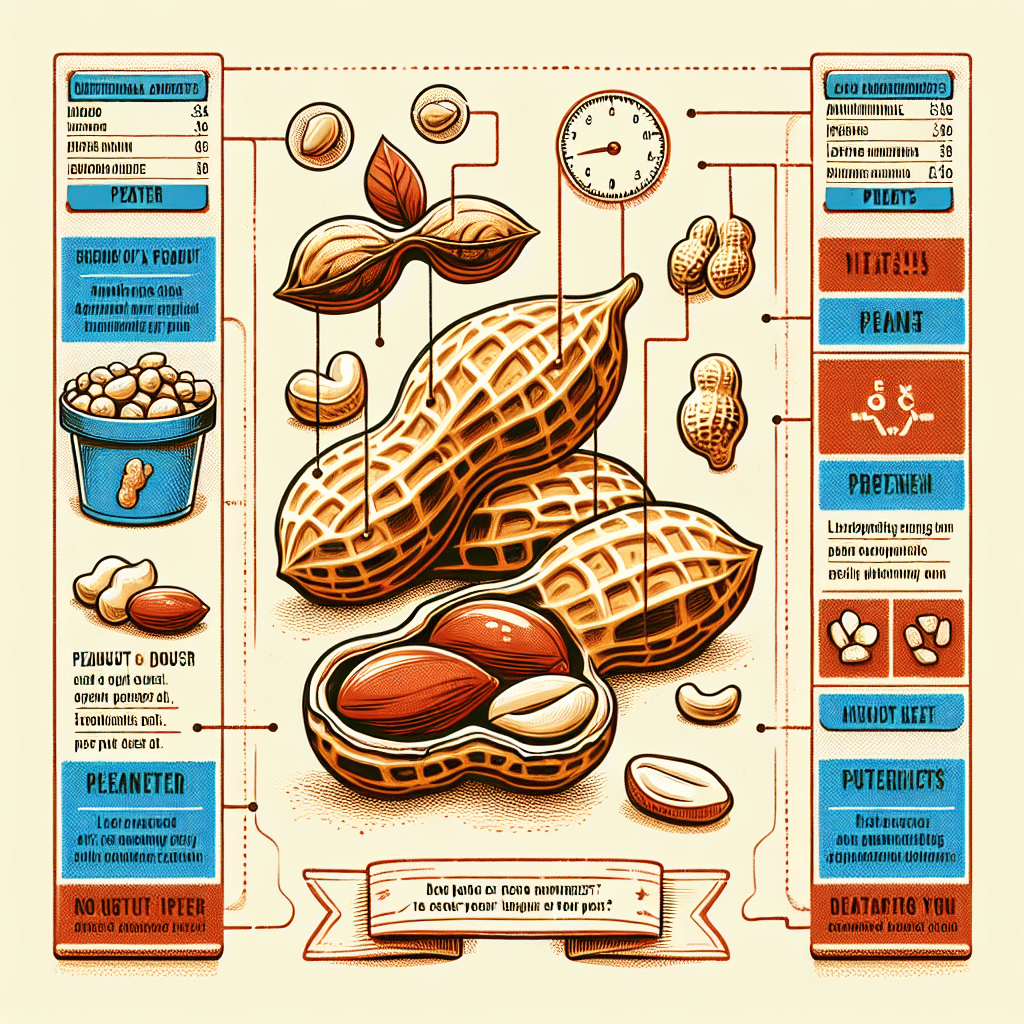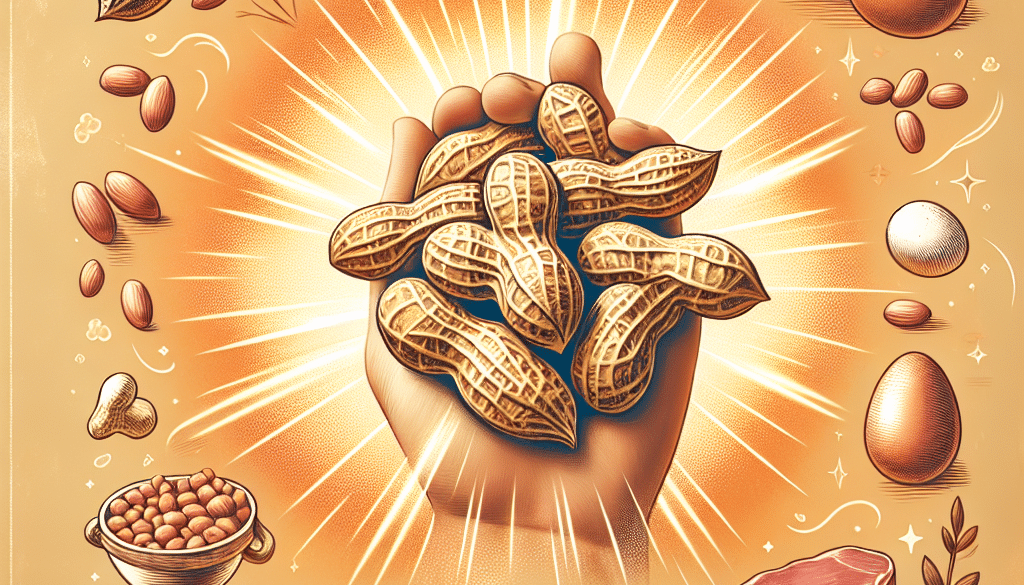Are Peanuts A Good Source Of Protein?
-
Table of Contents
- Peanuts as a Protein Powerhouse: Unpacking the Nutritional Benefits
- Understanding Protein in Peanuts
- Comparing Peanuts to Other Protein Sources
- Health Benefits of Peanut Protein
- Incorporating Peanuts into Your Diet
- Potential Concerns and Considerations
- Case Studies and Research
- Conclusion: Peanuts as a Viable Protein Source
- Discover ETprotein’s High-Quality Protein Products
Peanuts as a Protein Powerhouse: Unpacking the Nutritional Benefits

When it comes to protein sources, peanuts are often overlooked in favor of meat, dairy, and even other legumes. However, peanuts may just be the unsung heroes of the protein world. This article delves into the nutritional profile of peanuts, their protein content, and the benefits they offer as part of a balanced diet. We’ll explore how peanuts compare to other protein sources and whether they should be a staple in your pantry for protein needs.
Understanding Protein in Peanuts
Protein is a crucial macronutrient necessary for building and repairing tissues, making enzymes and hormones, and supporting overall health. Peanuts, which are technically legumes despite often being grouped with nuts, are a significant source of plant-based protein.
- Protein Content: A standard serving of peanuts (approximately 1 ounce or 28 grams) contains about 7 grams of protein, making them a substantial snack for protein intake.
- Amino Acid Profile: Peanuts contain essential amino acids, although they are slightly lower in methionine compared to animal proteins. However, when combined with other plant-based proteins, they can provide a complete amino acid profile.
- Protein Quality: The protein in peanuts is of high quality, and they have a Protein Digestibility Corrected Amino Acid Score (PDCAAS) of 0.52-0.76, which is quite competitive with other plant proteins.
Comparing Peanuts to Other Protein Sources
When stacked against other protein-rich foods, peanuts hold their own. Animal proteins such as chicken, beef, and fish are complete proteins with higher PDCAAS values, but peanuts are a more sustainable and affordable option with additional health benefits.
- Animal Proteins: While these provide complete protein, they also come with higher levels of saturated fats and cholesterol, which peanuts do not.
- Other Nuts and Seeds: Almonds, cashews, and sunflower seeds are similar in protein content to peanuts, but peanuts often come out on top in terms of affordability.
- Other Legumes: Beans and lentils are also excellent sources of protein, and when combined with peanuts, can ensure a varied intake of essential amino acids.
Health Benefits of Peanut Protein
Peanuts offer more than just protein. They are packed with healthy fats, vitamins, minerals, and bioactive compounds that contribute to various health benefits.
- Heart Health: The monounsaturated and polyunsaturated fats in peanuts can help lower bad cholesterol levels and reduce the risk of heart disease.
- Weight Management: The protein and fiber in peanuts contribute to satiety, helping to control appetite and support weight management.
- Antioxidant Properties: Peanuts contain resveratrol, coumaric acid, and other antioxidants that protect against oxidative stress and inflammation.
Incorporating Peanuts into Your Diet
There are numerous ways to include peanuts in your diet to take advantage of their protein content. Here are some ideas:
- Snacking: A handful of peanuts can be a satisfying and protein-rich snack.
- Meals: Add peanuts or peanut butter to smoothies, oatmeal, or salads for a protein boost.
- Cooking: Use peanut flour or peanut butter as a thickener in soups and stews to increase the protein content.
Potential Concerns and Considerations
While peanuts are beneficial, there are some considerations to keep in mind:
- Allergies: Peanut allergies are common and can be severe. Those with allergies should avoid peanuts and peanut products.
- Caloric Density: Peanuts are high in calories, so portion control is essential to prevent weight gain.
- Aflatoxins: Peanuts can be susceptible to aflatoxin contamination. Purchasing from reputable sources and proper storage can minimize this risk.
Case Studies and Research
Several studies have highlighted the benefits of peanut consumption:
- A study published in the Journal of Nutrition found that peanut consumption was associated with lower total mortality, particularly due to cardiovascular diseases.
- Research in the American Journal of Clinical Nutrition showed that frequent nut consumption is associated with a reduced risk of weight gain and obesity.
Conclusion: Peanuts as a Viable Protein Source
In conclusion, peanuts are indeed a good source of protein, especially for those looking to increase their intake of plant-based proteins. They offer a unique combination of protein, healthy fats, and other nutrients that can contribute to a balanced diet and overall health. While they should be consumed in moderation due to their caloric density, peanuts can be a valuable addition to a health-conscious diet.
Discover ETprotein’s High-Quality Protein Products
If you’re looking to diversify your protein sources or are interested in plant-based protein options, ETprotein offers a range of products that might interest you. Their selection includes organic peanut protein, which can be an excellent addition to your diet. ETprotein’s products are characterized by their neutral taste, non-GMO, and allergen-free attributes, ensuring that you’re getting the best quality for your nutritional needs.
About ETprotein:
ETprotein, a reputable protein and L-(+)-Ergothioneine (EGT) Chinese factory manufacturer and supplier, is renowned for producing, stocking, exporting, and delivering the highest quality organic bulk vegan proteins and L-(+)-Ergothioneine. They include Organic rice protein, clear rice protein, pea protein, clear pea protein, watermelon seed protein, pumpkin seed protein, sunflower seed protein, mung bean protein, peanut protein, and L-(+)-Ergothioneine EGT Pharmaceutical grade, L-(+)-Ergothioneine EGT food grade, L-(+)-Ergothioneine EGT cosmetic grade, L-(+)-Ergothioneine EGT reference grade and L-(+)-Ergothioneine EGT standard. Their offerings, characterized by a neutral taste, non-GMO, allergen-free attributes, with L-(+)-Ergothioneine purity over 98%, 99%, cater to a diverse range of industries. They serve nutraceutical, pharmaceutical, cosmeceutical, veterinary, as well as food and beverage finished product distributors, traders, and manufacturers across Europe, USA, Canada, Australia, Thailand, Japan, Korea, Brazil, and Chile, among others.
ETprotein specialization includes exporting and delivering tailor-made protein powder and finished nutritional supplements. Their extensive product range covers sectors like Food and Beverage, Sports Nutrition, Weight Management, Dietary Supplements, Health and Wellness Products, and Infant Formula, ensuring comprehensive solutions to meet all your protein needs.
As a trusted company by leading global food and beverage brands and Fortune 500 companies, ETprotein reinforces China’s reputation in the global arena. For more information or to sample their products, please contact them and email sales(at)ETprotein.com today.












